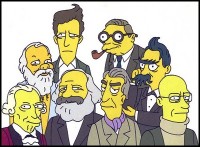PACTISS recommends

Where science meets art. The only necessary and sufficient book store in Melbourne.
Hope our friends enjoy the new look and feel – now optimised for mobile devices for access on the go.

PEOPLE
-
Coordinator: Peter Ellerton
Web guy: Jason Etheridge RESOURCE COLLECTIONS
NEW RESOURCES
-
- A nice Philosophy of Mind summary
- The power of categorical logic
- What exactly is the scientific method and why do so many people get it wrong?
- Paralympic athletes faster than olympic athletes — what does this tell us about difference?
- Logic: if + then = why? How can we understand the power of logic?
- How do we ensure we are exposed to new ideas? A parody with bite.
- A Life of Meaning (Reason Not Required) – What is the nature of our relationship with reason?
- Can you name this cognitive bias?
- By what measures can we value human life?
- Teaching philosophy improves standardised scores
- Are we in control of our own decisions?
- Neuroscience and education: myths and messages
- Free will is not as free as we think – and that’s ok.
- Where’s the Proof in Pseudoscience?
- Science in the lead?
RANDOM POSTS
-
- Social Philosophy booklet
- Logic: if + then = why? How can we understand the power of logic?
- The Fallacy of 'Deepest Offence'
- Curriculum Council Philosophy and Ethics (WA)
- Brain science and the search for the self
- Numbers and Language
- Q-Matrix
- The value of subjective experience (or not)
- Conspiracy, Independent Scholarship and the Truth as a Commodity
- Ethical Egoism
USEFUL RSS FEEDS
 Philosopher’s Zone
Philosopher’s Zone NYTimes – The Stone
NYTimes – The Stone Philosophy Now
Philosophy Now RSA Animate
RSA Animate- The Green Corridors Initiative
- Governance governing government
- Why print money when we can print wealth?
- Building a resilient health and care system
- We'll always have Paris?
- Experimentation and equity in global cities
- Technology-enabled deliberative democracy
- Healthier placemaking
- Creating a sovereign wealth fund in Wolverhampton
- Economic recovery and climate action
 Scientific American – Mind and Brain
Scientific American – Mind and Brain- Asexuality Research Has Reached New Heights. What Are We Learning?
- Political Ads Can Target Your Personality. Here's What Could Go Wrong
- Why Writing by Hand Is Better for Memory and Learning
- People with Myalgic Encephalomyelitis/Chronic Fatigue Syndrome May Have an "Exhausted" Immune System
- How to Close the 'Orgasm Gap' for Heterosexual Couples
- Virtual Bar Scenes Are a New Tool to Study Why People Commit Crimes in the Heat of the Moment
- Anger Can Help You Meet Your Goals
- How Sleep Engineering Could Help Heal the Brain
- Dominatrices Are Showing People How to Have Rough Sex Safely
- Farmers in Crisis, Long Overlooked, Are Finally Getting Mental Health Support
 TED talks
TED talks- War journalism should be rooted in empathy — not violence | Bel Trew
- The problem with food and climate — and how to fix it | Jonathan Foley
- How buildings can improve life — inside and out | Doris Sung
- The satellite helping slow climate change — right now | Millie Chu Baird
- What's possible when the arts belong to everybody | Lear deBessonet with Brian Stokes Mitchell
- “Cant de la Sibil·la” / "Quien Más Me Ama" | Maria Arnal
- Bravery, brilliance and RuPaul Charles | On the Spot | RuPaul Charles
- How to claim your leadership power | Michael Timms
- Why young people are worse off than their parents — and what to do about it | Scott Galloway
- Quantum computers aren't what you think — they're cooler | Hartmut Neven
THEMED RESOURCES
- July 2024MonTueWedThuFriSatSun123456789101112131415161718192021222324252627282930311234
Category Archives: Media Articles, Cartoons
Correlation Does Not Imply Causation
Another classic from Dilbert See also Post Hoc Ergo Propter Hoc
Posted in Critical Thinking, Media Articles, Cartoons
Comments Off on Correlation Does Not Imply Causation
Philosophical Zombies
From the concept by Chalmers. Could humans exist that are not conscious? The extract below is from his site. Philosophical zombies It is philosophical zombies that I’m most interested in here, since I’m a philosopher and they raise very interesting … Continue reading
Posted in Media Articles, Cartoons, Original Philosophical Texts, Philosophy of Mind - Consciousness
Comments Off on Philosophical Zombies
The Coherentist’s Nightmare
The coherency theory of truth
Posted in Critical Thinking, Media Articles, Cartoons, Philosophy of Language
Comments Off on The Coherentist’s Nightmare
1,500 Animal Species Practice Homosexuality
Not natural? Think again… Homosexuality is quite common in the animal kingdom, especially among herding animals. Many animals solve conflicts by practicing same gender sex. via http://www.news-medical.net/news/2006/10/23/20718.aspx?page=1 From the middle of October until next summer the Norwegian Natural History Museum … Continue reading
Posted in Ethics and Moral Philosophy, Media Articles, Cartoons
Comments Off on 1,500 Animal Species Practice Homosexuality
Conspiracy, Independent Scholarship and the Truth as a Commodity
Great stuff again from The Stone (NYTimes) Who Wrote Shakespeare? While it is perfectly obvious to everyone that Ben Jonson wrote all of Shakespeare’s plays, it is less known that Ben Jonson’s plays were written by a teen-age girl in … Continue reading
Posted in Critical Thinking, Media Articles, Cartoons
Comments Off on Conspiracy, Independent Scholarship and the Truth as a Commodity
The Backfire Effect
When people believe more strongly in something AFTER they have been given information that refutes it…. Good explanation here http://youarenotsosmart.com/2011/06/10/the-backfire-effect/ And paper by Brendan Nyhan here (pdf). Abstract below. An extensive literature addresses citizen ignorance, but very little research focuses … Continue reading
Posted in Booklets, Handouts and Worksheets, Critical Thinking, Media Articles, Cartoons
Comments Off on The Backfire Effect
Logic, Knowledge Systems and World Views
The way of logic – 02 December 1995 – New Scientist FOR almost two centuries, anthropologists have been studying how non-European cultures understand the world around them. Now philosophers of science are getting in on the act. Armed with intellectual … Continue reading
Posted in Media Articles, Cartoons, Philosophy of Language, Philosophy of Science
Comments Off on Logic, Knowledge Systems and World Views
Bayesian Inference (Homo Bayesianis)
Bayesian Inference (and a good explanation of Bayes’ Theorem) ~best to ignore this one if you’re not already in the loop~ via http://www.brera.mi.astro.it/~andreon/inference/Inference.html
Cognitive Dissonance Explained
By Dilbert, of course… Wikipedia cognitive dissonance.
Suing for Being Born
ISRAELI children with birth defects are increasingly suing the medical authorities for ever allowing them to be born. The rise in such “wrongful life” lawsuits, which the medical profession estimates at 600 since the first case in 1987, has prompted … Continue reading
Animal Actors – Animal Rights, Human Perceptions
Chimpanzees Should Not Be Used in TV or Movies (via Scientific American) Does the use of chimps in movies distort the conservation message? By Jason G. Goldman | October 12, 2011 | 3 Lots of people mistake bonobos for chimpanzees, despite the fact that they’re really … Continue reading
Pick your Cognitive Bias
Another brilliant Dilbert
Imagining the Tenth Dimension
Excellent intellectual exercise
A Wonderful Piece of Pseudoscience in Advertising
Well worth reading the whole lot. The language is absolute nonsense. “By strengthening the body’s own natural energy and innate intelligence, the QLink allows it to recognise and differentiate between which external energies are healthy, and which are not. The … Continue reading
Reasons for Reason
Via MICHAEL P. LYNCH NYTimes The Stone Rick Perry’s recent vocal dismissals of evolution, and his confident assertion that “God is how we got here” reflect an obvious divide in our culture. In one sense, that divide is just over the … Continue reading
How Science Works in Action
Faster-than-light neutrinos show science in action Making a very good point about when to believe evidence. via Scientific American Unless you’ve been hiding under a rock for the past 24 hours, you’ve probably heard about the neutrinos that … Continue reading
Ability to Think Scientifically Declines as Kids Grow Up
Young children think like researchers but lose the feel for the scientific method as they age via Scientific American If your brownies came out too crispy on top but undercooked in the center, it would make sense … Continue reading
The power of the non sequitur
From www.dilbert.com of course…
